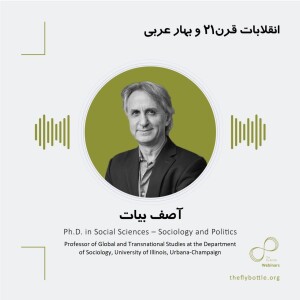
Monday Jun 05, 2023
قسمت ۷ - «انقلابات قرن ۲۱ و بهار عربی» در گفتوگو با آصف بیات
در این قسمت، مریم کریمی با دکتر آصف بیات دربارهٔ انقلابهای عربی و ناکامیهای آنها در دستیابی به اصلاحات دموکراتیک در سطح دولت گفتگو می کند. دکتر بیات به تغییرات اجتماعی مثبتی که در نتیجهٔ این جنبشها بوجود آمده است اشاره میکند. او با اشاره به تغییر دینامیک قدرت و سلسله مراتب اجتماعی در میان تودههای مردم و گروههای به حاشیه رانده شده، از جمله زنان، کارگران و جوانان اشاره می کند و نمونههایی را از تلاش مردم برای رسیدن به جامعه دموکراتیک و عادلانه تر بیان می کند.
آصف بیات استاد جامعه شناسی و استاد کرسی کاترین و بروس باستین در مطالعات جهانی و ترا-ملیتی در دانشکده جامعه شناسی در دانشگاه ایلینوی در اُربانا-شمپین است. قبل از پیوستن به این دانشگاه، دکتر بیات سال ها در دانشگاه آمریکایی قاهرۀ مصر تدریس کرده و به عنوان مدیر مؤسسۀ بین المللی برای مطالعۀ اسلام در جهان مدرن صاحب کرسی جامعه و فرهنگ خاورمیانۀ جدید در دانشگاه لیدن هلند بوده است. همچنین، وي در دانشگاهها و کالج های کاليفرنيا بركلی، كلمبيا، آكسفورد و براون نيز استاد مهمان بوده است. وي همچنين عضو ارشد «مؤسسۀ پژوهشهای تجربی دربارهٔ همبستگی و مهاجرت در دانشگاه هومبولت برلین است.
مریم کریمی معمار و دانشآموختهٔ دکتری فلسفه هنرهای بصری در دانشگاه یورک کاناداست. پیش از پیوستن به یورک، مریم در دانشگاه واترلو به تحصیل معماری پرداخته بود.
صدا و موسیقی: رضا ندری
پوستر: پویا فتورهچی
تهیهکنندگان: عطا حشمتی و یگانه خزایی
--
This Episode will examine the Arab revolutions of the 2010s and their shortcomings in achieving democratic reforms at the state level. Asef Bayat will discuss the positive social changes that arose as a result of these movements, specifically among grassroots and subaltern groups, including women, the poor, and marginalized youth. He argues that these struggles have intrinsic value and can serve as a foundation for building radical democratic principles from the ground up. The speaker will provide examples of how these movements have contributed to a shift in power dynamics and challenged existing hierarchies, paving the way for a more democratic and equitable society. Through this analysis, the audience will gain insight into the complexities of democratic reform in the context of Arab revolutions, and the role that grassroots movements play in shaping a more democratic future.
Asef Bayat is a Professor of Sociology, and the Catherine and Bruce Bastian Professor of Global and Transnational Studies at the Department of Sociology, University of Illinois, Urbana-Champaign. Before joining Illinois, Bayat taught at the American University in Cairo for many years and served as the director of the International Institute for the Study of Islam in the Modern World (ISIM) holding the Chair of Society and Culture of the Modern Middle East at Leiden University, The Netherlands. In the meantime, he had visiting positions at the Universality of California, Berkeley, Colombia University, Oxford, and Brown. He is also an Associate Member of the Berlin Institute for Empirical Research on Integration and Migration (BIM), Humboldt University in Berlin, Germany.)
Maryam Karimi is a graduate of a doctoral degree in philosophy, practice- based Ph.D. in visual arts at York University. She completed a Master's degree in Architecture (M.Arch.) and a Bachelor's in Architectural Science (B.Arch. Sci) from the University of Waterloo.
Suggested Readings:
- Revolutionary Life: The Everyday of the Arab, 2021 by Asef Bayat (Author)
- Post-Islamism: The Many Faces of Political Islam, 2013 by Asef Bayat (Editor)
- The Last Man Takes LSD: Foucault and the End of Revolution, 2021 by Mitchell Dean (Author), Daniel Zamora (Author)
Sound & Music: Reza Nadri
Cover art: Puya Fatoureh-chi
Produced by Ata Heshmati & Yeganeh Khazaei in the Flybottle Podcast
Comments (0)
To leave or reply to comments, please download free Podbean or
No Comments
To leave or reply to comments,
please download free Podbean App.